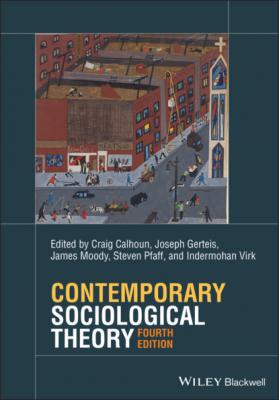Contemporary Sociological Theory. Группа авторов
Читать онлайн.| Название | Contemporary Sociological Theory |
|---|---|
| Автор произведения | Группа авторов |
| Жанр | Социология |
| Серия | |
| Издательство | Социология |
| Год выпуска | 0 |
| isbn | 9781119527237 |
That different theories can complement each other does not mean that they always fit neatly together. On the contrary, theories often start with different assumptions about human nature or about the nature of knowledge (epistemology); they frequently focus on different levels of social reality. These differences mean that fitting them together in any specific analysis always requires creative work and decisions. Theory is something to do, not simply to read. The theoretical resources available to today’s sociologists are enormous, but this does not mean that theoretical work can stop.
NOTES
1 1 Peter Blau, Inequality and Heterogeneity. New York: Free Press, 1977.
2 2 Thatcher, Interview for Women’s Own: https://www.margaretthatcher.org/document/106689.
3 3 Claus Offe, Disorganized Capitalism: Contemporary Transformations of Work and Politics (Cambridge: Polity, 1985); John Keane, Public Life and Late Capitalism (Cambridge: Cambridge University Press, 1984).
4 4 Parsons, Talcott. 1951. The Social System. Glencoe, IL: Free Press; Anthony Giddens, “The Concept of ‘Power’ in the Writings of Talcott Parsons,” in Studies in Social and Political Theory (New York: Basic Books, orig. 1967).
5 5 Randall Collins, Conflict Sociology. Amsterdam: Elsevier, 1977.
6 6 Mann, The Sources of Social Power, Cambridge: Cambridge University Press, 4 vols., 1986–2012.
7 7 In the words of Kingsley Davis and Wilbert E. Moore “Social inequality is … an unconsciously evolved device by which societies ensure that the most important positions are conscientiously filled by the most qualified persons,” “Some Principles of Stratification,” American Sociological Review, 10 (2) (1945): 242–9, p. 248.
8 8 Thomas Pikkety, Capital in the 21st Century, Cambridge, MA: Harvard University Press, 2014.
9 9 Mike Savage, The Return of Inequality: Social Change and the Weight of the Past. Cambridge, MA: Harvard University Pres, 2021.
10 10 Bourdieu, The Logic of Practice, Stanford: Stanford University Press, 1990.
11 11 Bourdieu and J-C Passeron, The Inheritors: French Students and their Relations to Culture, Chicago: University of Chicago Press 1979 (orig. 1964).
12 12 Bourdieu, Distinction. Cambridge, MA: Harvard University Press, 1984. The Rules of Art. Stanford, CT: Stanford University Press, 1996.
13 13 Bourdieu, Outline of a Theory of Practice. Cambridge: Cambridge University Press, 1976; Practical Reason. Stanford, CT: Stanford University Press, 1998.
14 14 Foucault, Madness and Civilisation, London: Routledge 2006 (orig. 1961).
15 15 Foucault, Birth of the Clinic, NY: Vintage 1994 (orig. 1974); The Order of Things, New York: Random House, 1994 (orig. 1966); The Archaeology of Knowledge, NY: Vintage, 1982 (orig., 1969).
16 16 Foucault, Michel. Discipline and Punish. New York: Pantheon, 1977 (orig. 1975).
17 17 Foucault, Michel, The History of Sexuality. New York: Pantheon, 3 vols, 1976–88 (orig. 1976–84).
18 18 On the history of ‘race’ as an idea, see Ivan Hannaford, Race: The History of an Idea in the West, Washington, DC: Woodrow Wilson Center Press, 1996.
19 19 On Jefferson’s ‘Black’ descendants, see Annette Gordon-Reed, The Hemingses of Monticello: An American Family, NY: Norton, 2009.
20 20 Alondra Nelson, The Social Life of DNA, Boston: Beacon, 2016.
21 21 Du Bois, “The souls of white folks,” in Darkwater: Voices from Within the Veil. Amherst NY: Humanity Books, 2003 (orig. 1920): 55–74. See Steve Garner, Whiteness: An Introduction, London: Routledge, 2007.
22 22 Troy Duster, Back-Door to Eugenics, London: Routledge, 2nd ed., 2003.
23 23 Gilroy, The Black Atlantic, Cambridge, MA: Harvard University Press, 1995.
24 24 https://www.blackpast.org/african-american-history/1900-w-e-b-du-bois-nations-world.
25 25 Omi and Winant, Racial Formation in the US, London: Routledge, 3rd edition, 2014.
26 26 Crenshaw, “Demarginalizing the Intersection of Race and Sex: A Black Feminist Critique of Antidiscrimination Doctrine, Feminist Theory and Antiracist Politics,” University of Chicago Legal Forum, Issue 1 Article 8, 1989: 139–167.
27 27 DuBois, The Souls of Black Folk. New York. Dover, 1989 (orig. 1903). See also Du Bois’ account of the way typical gender identities focused on women as mother’s and not on the intelligence and capabilities they brought to other dimensions of life, “The Damnation of Women,” pp. 78–94 in Darkwater, NY: Harcourt, Brace and Howe, 1920.
28 28 Collins, Intersectionality as Critical Social Theory, Durham: Duke University Press, 2019.
29 29 Bauman, Modernity and the Holocaust, Cambridge: Polity, 2006.
30 30 Rodeny, How Europe Underdeveloped Africa, London: Verso, 2018 (orig. 1972).
31 31 Amin, Eurocentrism, New York: Monthly Review Press, 2010 (orig. 1988).
